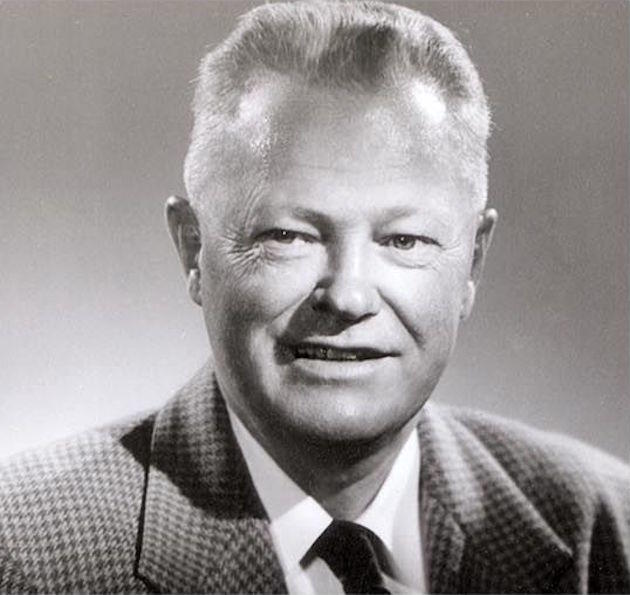Photo via the Fresh Water Fishing Hall of Fame & Museum
Picking the “best” Gordon MacQuarrie quotes is practically impossible. They’re all supremely eloquent and thoughtfully crafted, with none completely outshining the others. That’s not surprising since MacQuarrie was not only one of the greatest outdoor writers ever, but the first full-time outdoor writer and editor in American history.
MacQuarrie was born in 1900 and died in 1956. In the dash between the dates, he worked in the newspaper industry as a reporter and editor. His outdoor columns transformed the way newspapers covered hunting and fishing, moving from facts and figures to the romance and emotion of the outdoor sports.
His writing also appeared in magazines like Field & Stream and Sports Afield. His pieces on fly fishing Wisconsin’s Brule River are at the top of the sport’s musings; his ability to capture the whistle of wings puts him in a league of his own in the waterfowl-hunting world.
His most famous stories involve the Old Duck Hunters Association, Inc., a semi-fictional group of hunters and fishermen based on MacQuarrie and his friends. His first wife’s father provided the basis for “Hizzoner,” the president of the group and MacQuarrie’s near-constant companion. The two formed the nucleus of the stories, with other characters appearing from time to time. The two fished and hunted together for years until the real-life passing of MacQuarrie’s father-in-law, at which point MacQuarrie quit writing the series. Only after a period of grieving, and at the request of readers, did he resurrect the ODHA and elect a man to inherit Hizzoner’s old brown mackinaw.
Perhaps the greatest commentary on MacQuarrie’s contributions to outdoor literature came from compiler and fan Zack Taylor. Taylor lovingly and painstakingly collected MacQuarrie’s stories into three volumes — The Gordon MacQuarrie Sporting Treasury, More Stories of the Old Duck Hunters, and Last Stories of the Old Duck Hunters. Some of the articles had never appeared in book form before; others were brought back from the realms of out-of-print obscurity with help from MacQuarrie’s relatives. As a result, MacQuarrie is one of only four outdoor writers from his day to still be in print — the others are Archibald Rutledge, Nash Buckingham, and Havilah Babcock.
In his introduction to Sporting Treasury, Taylor wrote:
“His stories shaped my teenage years. I yearned for the life he led. I delighted in his passions. I envied his friendships and warm ways. I wanted to be like him and live the life he lived. I did live the life he lived.”
Below are some particularly beautiful quotes from MacQuarrie’s stories. “Nothing To Do For Three Weeks” alone could provide 20 or 30, but for now we’ll include a smattering of all the great’s greats. I would say “Enjoy!” but with MacQuarrie it’s a forgone conclusion.
– Taylor J. Pardue, Editor
“The man kneeling in autumn leaves dressing his first partridge should know that he is of the elect, that he has entered that Valhalla of sport where the best is hard to get, and the getting the best part of it.”
– “Native Son”
“I left long before daylight, alone but not lonely.”
– “Nothing To Do For Three Weeks”
“Then the little ‘slaps’ of playful six-inchers give way to businesslike ‘ker-plunks’ as more powerful tails hit the surface. A street of water during the midday, seemingly as empty as a deserted city, becomes an avenue of fish life, with its inhabitants eager for the evening hatch — and maybe the angler’s fly.”
– “Trout Town”
“That river — that Brule — sweeping for 66 miles from the heart of Douglas County, Wisconsin, to Lake Superior. I’ve already said too much about it … I must be cautious, but it is hard to even think of it without accompanying rhapsody. But maybe it’s not a bad thing to fall in love with a river.”
– “That River … The Brule”
“Sure, I could have redeployed those blocks and got some shooting. But it wasn’t that urgent. The morning had told me that they were in, and there was a day called tomorrow to be savored. No use to live it up all at once.”
– “Nothing To Do For Three Weeks”
“There is something about rain … A night in summer when the clouds can swell no more and shrink from threatening battlements to ragged shreds over Wisconsin, I often get up from my chair, go to the big closet, and speculate over the implements of trout fishing there. ”
– “Upon The Earth Below”
“Someone once said, ‘Never give your heart for a dog to tear.’ In a lifetime of owning dogs, I’ve sometimes steeled myself to obey that injunction, because a dog can hurt you awfully. I don’t mean to be cynical. Truth is, I’m not so bullet-proof when it comes to dogs. But it’s a real world we live and dwell in. Dogs and people can’t live forever. Dog lives, like ours, are mixtures of supreme happiness and deep despair.”
– “Kenai, Dog of Alaska”
“Nitro cracking in woodcock cover has something about it as respectable as a village church bell.”
– “Old Deacon Woodcock”
“I split maple and Norway pine chunks for the fireplace and kitchen range. This is work fit for any king. You see the piles grow, and indeed the man who splits his own wood warms himself twice.”
– “Nothing To Do For Three Weeks”
“I never wrote a poem in my life. But if I ever do, it will be about ducks.”
– “The Bluebills Died at Dawn”
“Twenty miles out of the big city a hunter with two beagles set off across a field toward a wood. For the next ten miles I was with him in the cover beyond the farmhouse and up the hill.”
– “Nothing To Do For Three Weeks”

